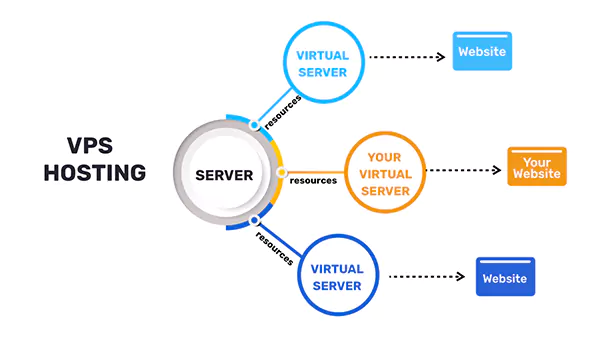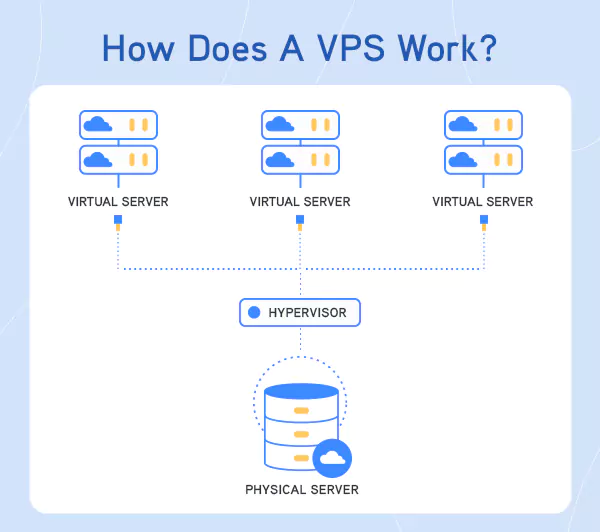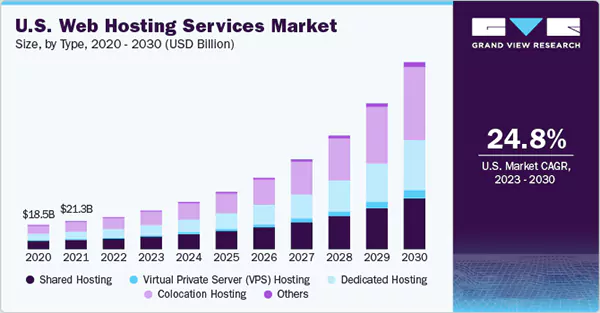“The secret of getting ahead is getting started” on your website!
Okay. So let’s open up with the elephants in the room!
Did you know 65% of the global population is on the Internet today, which makes it close to 5.3 billion Internet users?
Along with that, there are more than 1.97 billion websites online.
And now don’t you think getting ahead of the curve in this much competition is tough?
Well, it surely is!
So, how do you plan to beat it? Well, we have something that you might want to look for. And that something is VPS Hosting!
However, shared hosting is a fantastic starting point but as your website grows and business flourishes you might lack some much-needed resources. And there you have VPS Hosting as a savior of your small flourishing business.
Read on to explore whether you should consider VPS hosting or not. And how Elementor website builder is a winning combination to boost your website speed.
Let’s start!
What Exactly is VPS Hosting?

Virtual Private Server (commonly abbreviated as VPS) is a hosting type between shared and dedicated server hosting with a lot of advantages which made it a popular choice among the enterprise.
VPS Hosting allows you to host your website on a virtual private server which stores all of your required data to operate the site and unlike shared hosting, it provides tighter security as your website’s resources are not shared with any other user.
Did you know?
VPS platforms alone consist of 10.3% of the entire web hosting market
VPS hosting brings several advantages to its users and one of the key ones is that it improves your website speed. But how does it actually do that?
Let’s take a Look!
How Does VPS Hosting Improve Website Speed?
One Key advantage of using VPS hosting is that it can improve page loading time as its configuration and website layout itself is a crucial factor affecting website loading.
VPS solutions also provide fewer user accounts per server with only a specific amount of resources such as memory, disc space, CPU time, and bandwidth.
This guarantees that your website will have enough access to sufficient
server power, boosting your overall website speed.
VPS hosting brings several advantages and disadvantages that you might want to consider before selecting a hosting package for your website.

What are the Advantages of VPS Hosting?
Following are some of the benefits of using VPS hosting for your website:
- Easy customization: VPS hosting provides you with a ton of customization features such as allowing you to control security concerns, offering you root access, and allowing you to install scripts and applications to your tailored needs.
- Higher security: Security is a paramount feature of VPS hosting as you are the only one with access to your virtualized security server. This is why there is no actual danger of another user gaining access to your website.
- VPS services prices: As it qualities, the price of VPS hosting also falls somewhere between shared and dedicated hostings. It is available at a moderate monthly cost and saves you a ton of money when compared to dedicated server hostings.
- Maintainance and Access to the Server: Another advantage of VPS hosting is that you don’t have to worry about the daily software updates anymore because your hosting company will take care of the whole maintenance part.
- Technical requirement: VPS hosting offers you better bandwidth and storage for your website along with scalable plans that can adapt according to your website traffic.

{The above graph shows the U.S web hosting services market including shared hosting, VPS hosting, dedicated hosting, and others from 2020 to 2030}
What are the Disadvantages of VPS Hosting?
Now take a look at some of the drawbacks of VPS hostings:
- Costly: If you are just getting started you might find VPS hosting a more expensive solution when compared to shared hosting services.
- Technical knowledge is required: It requires a greater level of technical knowledge. However, you can choose a fully managed package but again it would be more expensive.
- Technical issue: If you are thinking of managing your VPS hosting, you must ensure the correct steps because you might face technical glitches or put your website at a higher security risk.
Did you know?
Around 51% of hosting service providers are based in the United States.
Tips for Optimising VPS Performance?
Here are 9 ways you can use to optimize your Virtual Private Server performance:
- Keep your VPS operating system and software up-to-date
- Optimize your database for better performance it can include tuning parameters, creating indexes, and cleaning up old data.
- Use a Content Delivery Network (CDN) which helps you store cached versions of your content on your geographically servers.
- Caching reduces page loading time and boosts website speed by frequently storing access data in the memory.
- Use a reverse proxy to offload the work of your VPS such as handling SSL termination, caching, and compression.
- Utilize a load balancer to distribute traffic among multiple servers.
- Employ a monitoring tool to detect and troubleshoot any issue while keeping track of your VPS performance.
- Optimize website code to speed up website loading time.
- Tweak the configuration of your web server such as increasing the number of worker processes, setting appropriate timeouts, and enabling Gzip compression.
Future of VPS Hosting
The Future of VPS Hosting holds several exciting trends and innovations that will shape the whole VPS environment:
Here’s a glimpse of what the future may hold for VPS hosting:
- Serverless computing in VPS hosting allows users to run applications without managing the server’s infrastructure.
- Embracing Edge Computing Integration to improve performance for applications, requiring real-time responsiveness.
- Advanced virtualization technology such as improved hypervisors and containerization solutions, enhances efficiency and resource utilization.
- With the help of AI and Autonomation automated scaling, predictive analytics, and intelligent resource allocation are simplifying the management of VPS instances.
- Improved security measures with the help of advanced intrusion detection systems, zero-trust security models, and automated threat response mechanisms.
Also…
The increasing number of E-commerce websites will most likely fuel the future of VPS services.
Bottom Line
In closing, having a reliable hosting service is a crucial component for website owners that not only keeps track of their website but also brings a lot of forthcoming benefits.
This can include, increased reliability, fully managed services, and increased efficiency on eco-friendly platforms along with cost-effectiveness.
There you have it your complete guide to VPS hosting, how it improves website speed, its pros and cons, and what kind of trends and innovations are shaping its future. Hope it helps.
Thanks for reading!
Frequently Asked Questions
Ans: VPS acts as an isolated virtual environment on a physical server, operated by a cloud or web hosting site.
Ans: A high-quality VPS can handle up to 50,000 daily visitors along with optimized website content.
Ans: Here are some of the factors you should consider when choosing a VPS hosting plan:
- Server resources such as RAM, CPU, Storage SSD, and bandwidth
- Scalability and reliability
- Operating system options
- Security features
- Pricing and contract length
- And customer services
Ans: Yes, VPS is a good choice for hosting sites with small workloads, requiring consistent performance.







